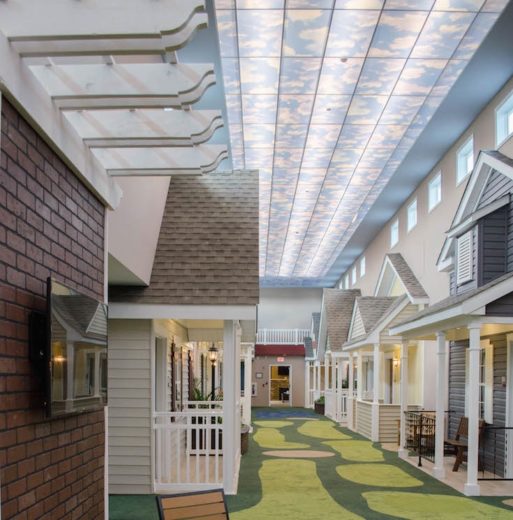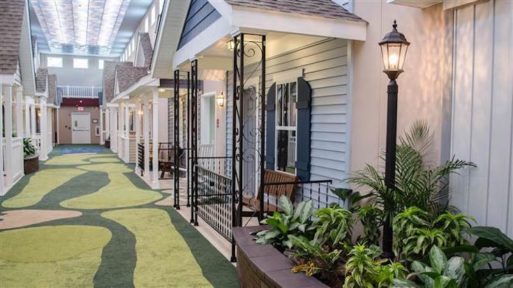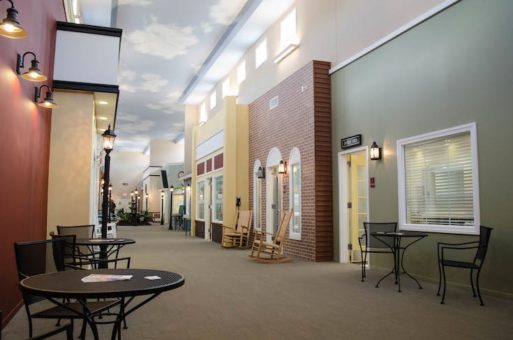Traditionally, assisted living facilities are quite drab environments. Even those that strive for a more welcoming atmosphere, with amenities like communal dining rooms and colorful decor, typically fall far short of providing a setting in which residents feel at home. For elderly persons with Alzheimer’s or dementia, this institutional atmosphere is not just inhospitable, it’s actually detrimental to their physical and emotional health.

Natural lighting helps maintain residents’ biological clocks
(Credit: upworthy.com)
But now an assisted living center in the Midwest is showing the rest of the country what an eldercare facility can and should be. Thanks to the innovative thinking of CEO Jean Makesh, the Lantern community in Madison, Ohio has taken everything “typical” about assisted living environments and turned it, quite literally, on it’s ear.
“I thought I knew a lot about elderly care,” said Makesh in an interview with Upworthy last year. But as he watched one elderly client after another become more and more confused while living at Lantern, he realized, “Oh my god, I have no clue.”
That’s when Makesh decided to apply his knowledge of the connection between environment and well-being to Lantern community’s interior design. “What if we design an environment that looks like outside?” he said. “What if I can have a sunrise and sunset inside the building? What if I’m able to have the moon and stars come out? What if I build a unit that takes residents back to the ’30s and ’40s?”

Credit: upworthy.com
And that’s just what he did. The new assisted living facility is inviting and realistic and 100 percent unique. The corridors look like well-tended front lawns, and each of the rooms sport a facade that looks just like an old-fashioned front porch. One corridor is even decorated to look like “Main Street, U.S.A.” Lined with bistro tables and rocking chairs, it’s a perfect place for residents to sit quietly and relax or linger over coffee for a friendly chat.
But Makesh didn’t stop there. He knew that the unnatural lighting in most institutional settings wrecks havoc with residents’ biological clocks. (This is believed to be major factor in sundown syndrome, a disorder that causes persons with dementia to become disoriented and agitated during the evening hours and sometimes throughout the night.) So he installed a “digital sky” that is brightest in the morning and grows dimmer as the day goes on. He also added scent diffusers to make use of aromatherapy.

Credit: upworthy.com
“During breakfast or lunch we want them to eat,” Makesh said. “So we’ll pump in certain appetizing aromas like peppermint or citrus.” Other scents improve mood or help with agitation, he explained. Rather than resorting to pharmaceuticals, which sedate clients into compliance but prevent them from engaging in a meaningful way, these natural therapies will improve their symptoms over time, Makesh believes.
“In five years, we’re going to rehabilitate our clients where they can live independently in our environment,” he says. “In 10 years, we’re going to be able to send them back home.”
Makesh is so pleased with the results he’s seeing at the assisted living facility in Madison that he plans to convert two additional Lantern communities to the new design this year. He also wants to expand the concept and build more communities sometime soon.

 A Unique Assisted Living Facility Offers Dementia Patients Hope
A Unique Assisted Living Facility Offers Dementia Patients Hope


 First the Wealth Gap, Now the U.S. Has a Growing Health Gap
First the Wealth Gap, Now the U.S. Has a Growing Health Gap
 How to Comfort A Dying Loved One
How to Comfort A Dying Loved One
 Our Annual Seven Holiday Gifts for Someone Who Is Grieving, 2024 Edition
Our Annual Seven Holiday Gifts for Someone Who Is Grieving, 2024 Edition














